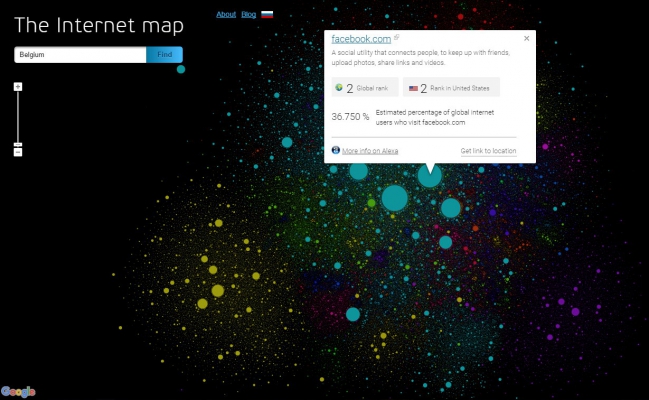Somehow Related : Links - Information
If The Challenge includes studying ahead of time to increase one's knowledge about Targets for Send(ing)ThemPeace, where does one go to get such information? The days spent at one's local library are becoming few and far between. Compare that with the number of days per month, you spend without Internet...
Who are the merchants of this information?
Here is an interesting Interactive Map of the Internet. You can sort it by entering your country, or another. You can enter a website's address and see where it appears.
Here is an example for "Belgium" entered in the Find box. The larger the ball or star in this universe, the greater the number of users.
For instance in Belgium, Facebook.com is number two. 36.75% of global users visit Facebook.com
( click to enlarge )
This leads easily to several questions.
Does visiting a site mean :
- one is passing through for amusement?
- one is obtaining one's information?
- one is shopping for an object?
- one is looking for someone else with whom to make contact?
- ALL of the above?
- Will the source of information most often selected, vary greatly from country to country?
- Does this change how people in a country see the world?
At least, if a user of the Internet doesn't have much time to be online, where is he/ she going to head most often? And is that site a good source of information? Perhaps just a dumbed-down version of "good information," or "just the facts" or "propaganda"? And are those who are repeating the information obtained, on Social Networking sites, repeating it correctly? Or does it become like the party game, "Telephone," where the initial message conveyed and the last, may be quite different.
Perhaps people aren't seeking any information at all... perhaps they have too much information. "Let's buy something!" So, PayPal ranked 38th globally, eBay ranked 17th and Amazon.com ranked 6th. While Wall Street Journal (WSJ.com) 338th, FoxNews 192nd, HuffingtonPost.com is 123rd, NY Times, 97th, CNN.com 75th, and Washington Post not ranked globally, but 52nd in the USA. Things "in the News," become sources of information as well: CharlieHebdo.com, 35th globally, and 41st in the USA where almost nobody on the street speaks French! Are we seeking news that informs,... or news that's sensational and there to entertain us?
How does this map vary significantly for USA, Russia, China, South Korea, Qatar, Japan? Once you have entered a country, the number one source will show up as a quite large "star" or ball. But remember to scroll out to help put this country's usage (usually the same colored "stars", clustered together), in perspective within the Internet Universe. Why is Colombia closer to the USA in the Internet Universe, than Brazil is, or these two South American countries to one another? To get a sense of persepctive, search or find on "Skynet.be" the primary telecommunications provider in Belgium. Scroll out to see it's place in this Universe of the Internet. No time to do this? Let me tell you: ranked 15,304th, globally. And ranked 132nd in Belgium, so Belgians are "going elsewhere" to get their information, besides to a principle Belgian presence.
What does it mean that the primary sources of information globally are Google, Facebook, Youtube, Yahoo, Wikipedia, Twitter, LinkdIn? As it should be? Should Wikipedia find a place above Facebook?
What do you think about the major sources of information as presented on this map for your country, or your favorite site?
Do all countries use the same source for acquiring the requisite knowledge to make Peace a reality?

